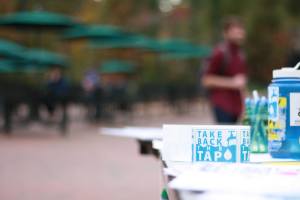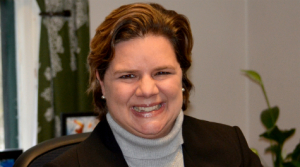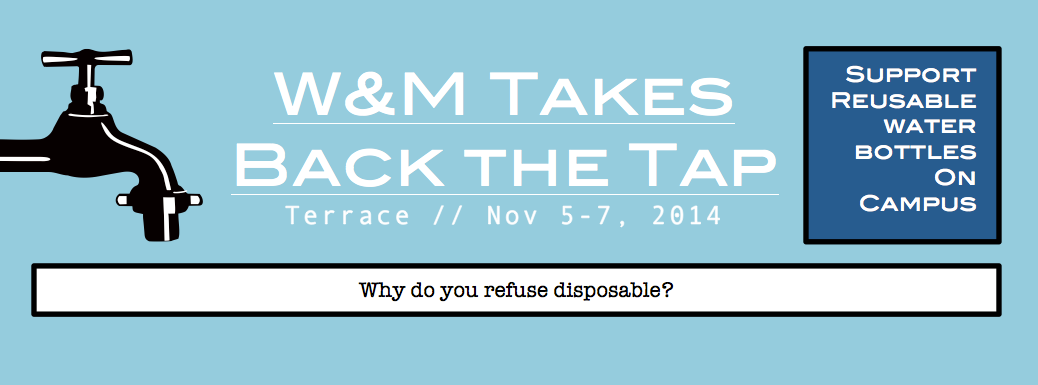College of William and Mary students might have noticed fellow students being photographed inside a poster frame on the Sadler Center terrace Nov. 5 and 7. The photos are part of an initiative supporting reusable water bottles on campus.
Take Back the Tap and the Student Environmental Action Coalition presented this photo campaign to showcase their supporters and attract attention for TBT’s petition to reduce or eliminate disposable water bottles on campus.
TBT formed this semester and held its first meeting in late September. Last month, it hosted a showing of the documentary “Tapped” to increase awareness about the problems of the bottled water industry.
According to the campus coordinator of TB
College of William and Mary students might have noticed fellow students being photographed inside a poster frame on the Sadler Center terrace Nov. 5 and 7. The photos are part of an initiative supporting reusable water bottles on campus.
Take Back the Tap and the Student Environmental Action Coalition presented this photo campaign to showcase their supporters and attract attention for TBT’s petition to reduce or eliminate disposable water bottles on campus.
TBT formed this semester and held its first meeting in late September. Last month, it hosted a showing of the documentary “Tapped” to increase awareness about the problems of the bottled water industry.
According to the campus coordinator of TBT, Hannah Dempsey ’16, gaining signatures on the petition is the organization’s major goal this semester. Dempsey serves as the liaison between TBT and its endorser, the Food and Water Watch. The Food and Water Watch is an international consumer rights group based in Washington, D.C.
According to Food and Water Watch’s website, 56 colleges and universities have banned bottled water on their campuses. Eleven of those schools have complete bans on bottled water, including its sale at all campus locations.
TBT’s petition pledges to stop buying bottled water and to reduce its use for campus events; to invest in water fountains, filling stations and reusable water bottles; and to support policies that promote public water systems and ensure maintenance and upgrades needed in national water distribution systems.

The petition began online via Change.org and circulated through Facebook. Through the photo campaign on the terrace last week, the number of supporters soared from 200 to over 450. Several faculty members also signed the petition.
“We’re trying to reach about 500 signatures, plus as many faculty and staff signatures as we can get,” Dempsey said. “The ultimate goal for this semester is just to go to the administration, particularly Sodexo. They’re the ones that actually stock the bottled water on campus.”
Dempsey lacks confidence that one meeting with Sodexo USA would lead to any action. She said she believes that more campus support is necessary because of the profits from bottled water sales and lack of incentive. Evaluations on environmental friendliness do not include bottled water usage or sales.
“I think that we would need a lot more support to make that actually happen,” Dempsey said. “If they feel very strongly against it, we might need 75 percent of the student body.”
However, both Dempsey and TBT member Mary Ellen Garrett ’17 expressed hope that TBT can force change and awareness with its petition.
“The petition shows the administration and everyone here that people still know that their choices make a difference,” Garrett said.
Garrett was looking for a way to become involved with sustainability on campus when she heard about TBT.
“This is a sustainability issue that affects everybody because everybody drinks water,” Garrett said. “It just seemed like a very urgent issue that I really wanted to help out on.”
Director of Auxiliary Services Cindy Glavas said that several factors must be considered when discussing banning disposable water bottles.
“It would be important to know that it was something that faculty, staff and students supported and [to] learn what other schools have implemented,” Glavas said in an email. “There would also be a financial impact that would have to be considered.”
Glavas also said that faculty, staff and student support of a ban would significantly impact administrative consideration.
Dempsey said that a plan for another photo campaign next semester is a possibility due to this campaign’s initial success.
According to the campus coordinator of TBT, Hannah Dempsey ’16, gaining signatures on the petition is the organization’s major goal this semester. Dempsey serves as the liaison between TBT and its endorser, the Food and Water Watch. The Food and Water Watch is an international consumer rights group based in Washington, D.C.

According to Food and Water Watch’s website, 56 colleges and universities have banned bottled water on their campuses. Eleven of those schools have complete bans on bottled water, including its sale at all campus locations.
TBT’s petition pledges to stop buying bottled water and to reduce its use for campus events; to invest in water fountains, filling stations and reusable water bottles; and to support policies that promote public water systems and ensure maintenance and upgrades needed in national water distribution systems.
The petition began online via Change.org and circulated through Facebook. Through the photo campaign on the terrace this past week, the number of supporters soared from 200 to over 450. Several faculty members also signed the petition.
“We’re trying to reach about 500 signatures, plus as many faculty and staff signatures as we can get,” Dempsey said. “The ultimate goal for this semester is just to go to the administration, particularly Sodexo. They’re the ones that actually stock the bottled water on campus.”
Dempsey lacks confidence that one meeting with Sodexo USA would lead to any action. She said she believes that more campus support is necessary because of the profits from bottled water sales and lack of incentive. Evaluations on environmental friendliness do not include bottled water usage or sales.
“I think that we would need a lot more support to make that actually happen,” Dempsey said. “If they feel very strongly against it, we might need 75 percent of the student body.
However, both Dempsey and TBT member Mary Ellen Garrett ’17 expressed hope that TBT can force change and awareness with its petition.
“The petition shows the administration and everyone here that people still know that their choices make a difference,” Garrett said.
Garrett was looking for a way to become involved with sustainability on campus when she heard about TBT.
“This is a sustainability issue that affects everybody because everybody drinks water,” Garrett said. “It just seemed like a very urgent issue that I really wanted to help out on.”
Director of Auxiliary Services Cindy Glavas said that several factors must be considered when discussing banning disposable water bottles.

“It would be important to know that it was something that faculty, staff and students supported and [to] learn what other schools have implemented,” Glavas said in an email. “There would also be a financial impact that would have to be considered.”
Glavas also said that faculty, staff and student support of a ban would significantly impact administrative consideration.
Dempsey said that a plan for another photo campaign next semester is a possibility due to this campaign’s initial success.

